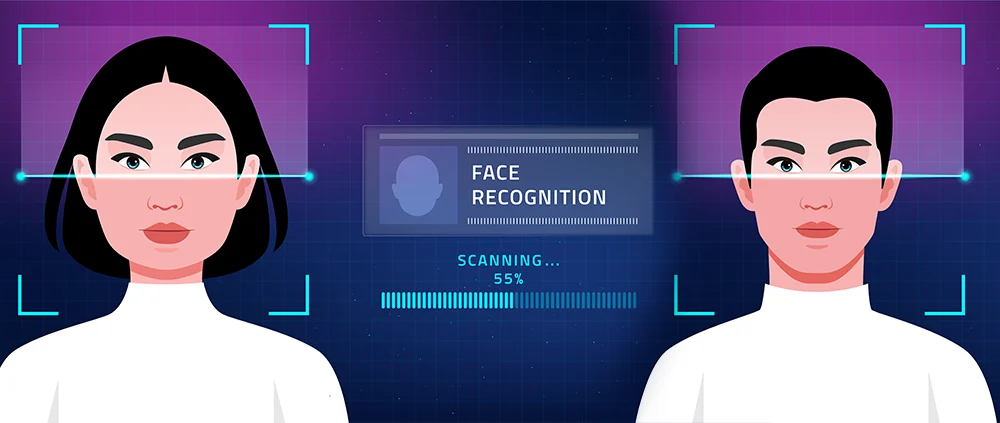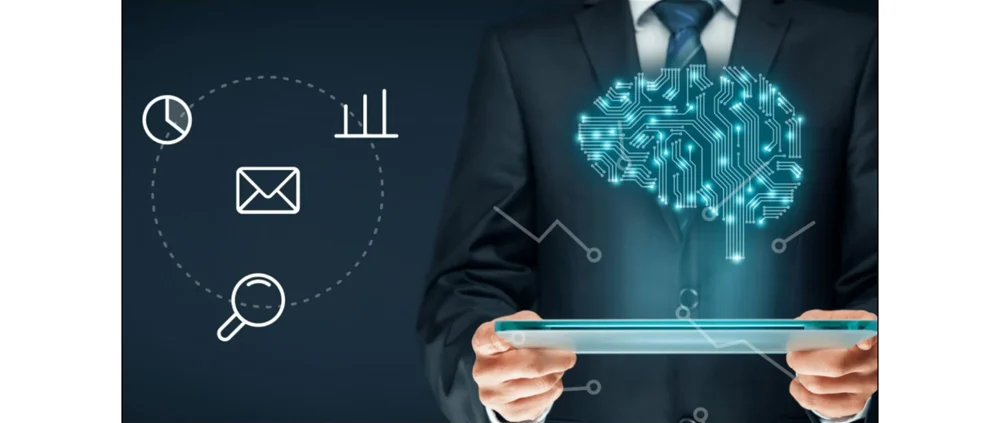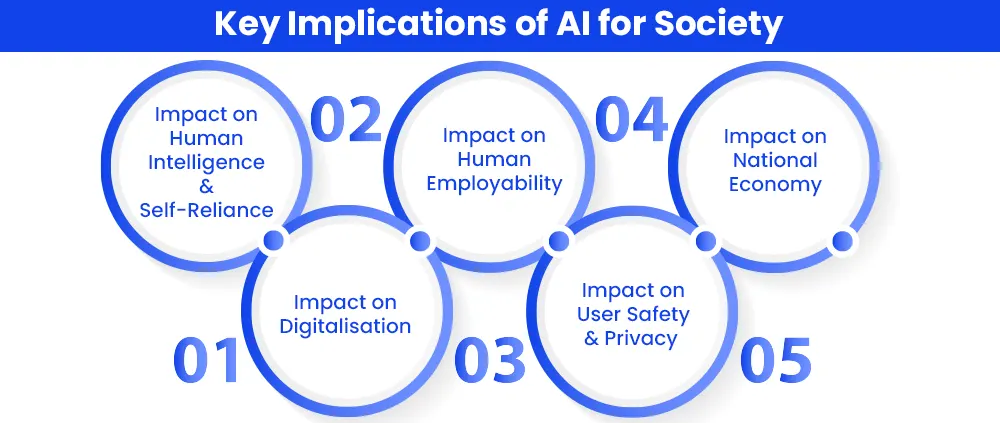Expert Interviews
- University Reviews
- Career Guide
 Video Counseling
Video CounselingImportant Facts
- Ask any Question - CV Forum

Top 10 Artificial Intelligence Examples: AI Applications In 2026
College Vidya Team Jan 22, 2026 1.7K Reads

The development of advanced AI technology and tools and softwares integrated with artificially intelligent features has led to a soar in the applications and niches in which AI has found its usage in recent times. Computer and mechanical capabilities paired with AI advancements has majorly transformed the landscape of digital services and uses in the past few years.
While the field of artificial intelligence is undoubtedly still in its inception stages, it is making significant breakthroughs and strides in becoming instrumental in a number of sectors like healthcares, agriculture, lifestyle, travel and tourism, education and the like.
|
|
|
|
|
|
|
|
|
In this blog, we have delineated a few of the major breakthroughs and applications that AI finds in our lives, starting right off from everyday uses extending to some of the more high stakes domains like education and healthcare.
What is Artificial Intelligence and How Does it Function?
Artificial intelligence, more commonly known by the abbreviation of AI, is in essence the intelligence displayed by a machine or a computer. It can be generalised to understand the intelligent processes displayed by a computer, a machine or a software, that mimics human intelligence. AI technologies integrate practices and features of deep learning, algorithms, machine learning and so on to devise softwares or AI models that are trained with vast datasets and can be used for making intelligent decisions and solving problems.
AI works on the basis of creation of a model that is further fed with the datasets provided to the system by the developer. Further, the AI model/program reads and analyses the given datasets through using a number of algorithms and statistical analysis. After this, the model stores the memory of the patterns observed through analysis, and uses these insights to make decisions and solve problems.
However the machine learning and deep learning features of AI enable it to move beyond the given patterns and insights to analyse and make its own creative decisions in addition to those reflected in existing datasets. While machine learning aids AI models in taking up feedback from humans to continually update its dataset and provide relevant results, deep learning technology helps analyse unstructured data. Furthermore, natural language processing (NLP) technologies enable the model to understand human language and convert it into a pattern understandable by machines or computer systems.
Artificial intelligence is a complex domain that brings together advancements in fields like cognition, neurology, neurobiology, machine learning, deep learning, NLP, IT and more. It is multilayered, and has much to offer with respect to various domains of human life.
Top 10 Examples of Use of AI in Everyday Life
The use of AI technologies in various domains of our lives are more prevalent than is often realised. Here, we have elaborated upon 10 of the most meaningful ways in which AI contributes to our everyday life and seamless functioning.
1. Use of AI Features for Online Shopping
The various smart suggestions that a user receives when searching for products, the personalised search results for various products and services, filing enquiries and chatting through service/complaint channels on the sites of various products or online shopping applications etc. are all manifestations of the use of AI technology to enhance the user experience. Similarly, be it virtual assistants aiding product selection or the spam eliminating features on e-commerce platforms, AI technologies underlie such breakthroughs.

Technologies like machine learning and deep learning along with algorithm based search, AI chatbot, AI-powered smart search features etc. are useful and frequently used in various e-commerce platforms and applications to enhance user experiences for online shopping.
2. Use of AI Technology for Virtual Assistance
Virtual assistants that find common usage in various electronic and digital platforms. Common examples that come to mind when thinking of a virtual assistant include Siri, Alexa, Google virtual assistant and so on. A large number of the live chat features or virtual assistants provided on the websites of various firms also make use of AI-powered technologies which include a mix of machine learning, natural language processing, statistical analysis, algorithmic execution as well as deep learning. NLPs are especially useful for virtual assistants in the chat features.
Such AI assistants can carry out a large number of digital tasks and find usage in the service sector, various electronic gadgets, applications, search engines and so on.
3. Recommendation Systems for Music and Video Streaming
This is another very common and pertinent domain where AI finds its usage but the applications of it are often overlooked. In the digital space dominated by individualised services and profile-relevant results, AI search engines, smart predictors and recommendation systems find usage in providing personalised results to users on music and video streaming applications. Various AI algorithms, datasets as well as training models that are fed into an AI-based streaming platform enable the service application/website to identify patterns of usage and preferences of a user to accordingly provide more relevant suggestions for music and videos in the future.

Such applications utilise statistical analysis and deep learning features that are integrated into the search features and suggestions features to gauge the underlying motive of a search and provide relevant and personalised suggestions to users. A very pertinent example of such technology is in the personalised features that music streaming applications like Spotify provides to users.
4. Use of AI Chatbots
AI chatbots are chatting or conversational platforms/applications that use artificially intelligent computer models to mimic human conversational styles to engage in conversations with users. Such chatbots have become quite popular ever since the release of Chat GPT by OpenAI, and newer advanced versions of chatbots have come up including the likes of Google Bard. The use of chatbots are not limited to mere conversation with users. Chatbots with AI capabilities are also trained to perform a number of other functions such as coding, programming, creative writing, information mining and so on. Hence, they have become more diversified over the past years in their function and more popular among users from diverse backgrounds including students, working professionals, artists, programmers and developers and so on.
Chatbots make use of natural language processing (NLP) models to firstly analyse human language and conversation and further convert them into codes understandable by machines/computers. Based upon rigorous statistical analysis and identification of patterns in human conversation based on fed datasets, chatbots create their own datasets of these patterns so as to effectively generate human-like conversational results. Further, being integrated with machine learning and deep learning technologies, such chatbots can learn to move beyond datasets of conversation to generate their unique conversational outputs. AI chatbots are one of the most useful and currently relevant examples of AI making its way into our everyday lives.
5. Use of AI-Powered Facial Detectors
Artificially intelligent facial detectors and face recognition programs make use of algorithms and datasets about facial features to scan faces and either detect them or match the features with specific users. Facial detection softwares and facial recognition programs find usage in security and surveillance industries, whether in the digital or physical mode. Modern facial detectors and recognition programs are used in phone and gadget security systems, for surveillance in banking and related domains as well as in high-security zones such as airports.

AI-enabled facial detectors and recognition softwares are prepared by feeding them with datasets that contain detailed information about facial features and dimensions of various users or the general population, which is then scanned by the AI recognition program to match them with existing data and quickly identify the user/person trying to access a secured platform/domain. The implications and scope for growth that such AI technologies have for enhanced security and privacy are tremendous.
6. Use of AI-Features for Personalised Services in Social Media
Personalised services in social media range from personalised suggestions, profile relevant information, suggestions for networking, connecting with acquaintances and so on. There are a number of features like avatars and personalised emojis and AI chatbots that are also being offered as advanced features in social media platforms. Spam protection, facial recognition as a measure of safe access as well as removal of posts that violate community norms of social media platforms are also an important arena where AI contributes to enhanced user experience.
Various algorithms, filters, datasets, deep learning, NLP technologies, data mining codes and machine learning features work in an integrative fashion to provide users with cybersafe, meaningful and enriching accounts with social media.
7. Use of AI-Powered Educational Learning Materials
The educational landscape has undergone a major shift in the past decade to incorporate a number of advanced features and facilities in the e-learning or virtual learning mode. The rapid digitalisation of primary, secondary and higher education implies that artificially intelligent technologies can make a significant contribution in this field, and its uses can be leveraged further than they already are.
For instance, currently, higher educational institutions benefit to a large extent from the administrative assistance that AI technologies help in performing. More importantly, AI features and advancements in the educational sector have brought about significant benefits to students. For instance, many virtual learning platforms provide dedicated “buddies” and academic mentoring assistants to students to facilitate their learning in the virtual medium. Moreover, the use of AI can also be appreciated in the creation of smart learning materials which are suited to the skills and needs of different students to provide more individualised educational support, an aspect which may get overwhelming to cater to by a single instructor/teacher in a classroom.
8. Use of AI-Powered Searching
Have you ever wondered about how a search engine looks up millions of web pages and provides the most relevant and personalised search results to you as a user? To no surprise, as has already been explained above, search engines use advanced AI technologies for extensive data mining along with features to align the personal preferences of users to the search results being provided.
AI technologies deployed in search engines enable them to keep track of the recent online searches of users, their preferences from search results and online activity over time. This further enables them to access stored data about the user to provide personalised search results, targeted advertisements or suggestions for future searches. Deep learning and machine learning technologies in combination with data mining technologies enable search engines to provide relevant and personalised results to users.
9. Use of AI Features for Spam Detection
Spam content on various media platforms, including spam messages, spam accounts, spam reviews and posts on social media etc. are one of the pertinent threats to security of platforms as well as the user experience on the particular platform. As a result many social media and review platforms use spam detection softwares which are well-equipped with AI technologies including deep learning and machine learning to effectively spot and eliminate spam accounts and their content.

Another important domain where spam detection software finds a major usage include the spam email identification. Certain email platforms including Gmail have deployed extensive spam filters equipped with AI features to infiltrate spam emails and display only the authentic email results in the inbox of users.
10. Use of AI in Banking and Digital Payments
E-payment platforms and UPI platforms as well as the banking sector make use of various AI tools and technologies to assist with the seamless and enhanced financial function of the sector. Some of the ways in which AI has been proven to be useful include fraud detection, automated assistance to users, loan approval prediction for users and so on. One of the major contributions of AI in the finance and e-payment sector include the analysis of patterns and discrepancies in financial transactions in various accounts to spot potential financial threats and breaches which can be cumbersome to manage manually.
Furthermore, AI technologies can be utilised by banks in allowing customers to virtually perform a variety of financial functions including account opening, filing enquiries and seeking their resolution, making seamless financial transactions and so on. These technologies leverage the advanced algorithmic functions that AI can manage to provide an individualised and effective experience to both the bankers and account holders.
Top 5 Excellent Applications of AI in the 21st Century
Further ahead, in addition to the various day-to-day domains in which AI features have found usage, herein we delve into some of the major breakthrough contributions of AI-powered technologies.
-
Implementation of AI in the Educational Sector
While some of the applications that AI-programs and softwares have found in recent times have already been elaborated upon, the overall face of education has certainly transformed due to the integration of artificial intelligence to facilitate learning. In addition to virtual learning materials and administrative support to educational institutions, AI also enables the personalised and self-directed learning of students, fostering independent and self-reliant education in them.
For instance, AI assistants and chatbots can provide practice assistance as well as smart (and mostly accurate) feedback to students about their performance instantly. AI-powered learning tools also help students to match the courses they pursue to their existing skill levels. An area of further development where the contribution of AI can be indispensable is providing learning support and softwares suited to the needs of differently-abled individuals.
-
Implementation of AI in the Healthcare Sector
While the use of AI and AI-powered tools in the healthcare sector received due criticism and skepticism in the initial years, it is currently finding its place in various domains of healthcare. It has been effectively applied in health monitoring and supervision to enable self-management of healthcare habits in patients. AI-powered tools find their usage in diagnostic purposes to spot abnormalities in patients’ tests, in health prediction applications which can use health record datasets to predict the future potential of developing ailments as well as in clinical trial optimizations.

A major breakthrough in this regard includes the accuracy with which AI tools have been able to spot and identify cancer in patients, including those like breast cancer, prostate cancer, liver cancer etc. Studies have exemplified that such AI tools can provide an accuracy of diagnosis of up to 94% in their results.
-
Implementation of AI in the Agricultural Sector
While the relation between agriculture and AI technologies may be more implicit to spot, the scope that AI has for transforming the practices in agriculture are quite prosperous in India. For instance, AI technologies, when paired with drone imaging, can significantly improve satellite-directed cropping practices by identifying crop health as well as assessing fertility of land. Predictive analyses to understand crop yield rates are another significant arena where agriculture can benefit from AI. Market forecasting based on similar predictive analyses of market data for crops can be used to enhance sales and revenue for farmers.
The implications of integrating AI with the steady automation of agricultural practices in India provides a vast arena for exploration and future development.
-
Implementation of AI in the Human Resource Management Sector
Human resource management (HRM) is a domain requiring nuanced attention to multiple arenas like effective recruitment and hiring practices, performance appraisals, grievance redressal, organisational development and so on. AI technologies can be fruitful in guiding processes in HRM such as recruitment and selection by smartly automating a range of tasks involved in the process such as skimming through a large number of applications, in performance appraisal by enabling the creation of criteria for appraisal, automating scoring and appraisal processes based on certain algorithms etc. In the recent past, a large number of advanced applications and softwares have come up with AI integrated features especially for the purpose of supporting human resource management in organisations.

-
Implementation of AI in the Travel and Tourism Sector
Ever wondered how applications like Uber and Ola manage such vast aspects ranging from searching for nearby vehicles to accurately directing and booking cabs for particular customers and from suggesting the best suited routes and optimising service charges based on various factors? Such applications are able to function effectively owing to the integrated algorithms in their softwares along with smart AI features which help in the variety of functions mentioned above. Similarly, AI technologies have contributed significant advancements in user experience in the travel and tourism sectors, such as in the case of smart assistance in GPS services, traffic management using AI powered predictive analysis and statistical analysis, route planning etc. The tourism sector can also provide many advanced services to tourists such as integrated smart applications which can perform various functions ranging from GPS navigation, translated instructions for tourists unacquainted with local languages, travel services, lodging services and so on. The contributions to the economy as well as towards enhanced user experience due to AI are worth exploring further and leveraging with time.
As a result, it can be seen that apart from finding various day to day uses, artificial intelligence (AI) technologies are significantly contributing to various high-stake industries such as medicine, healthcare, travel and tourism, human resource management and so on. The uses and applications of AI in these fields are budding currently and are expected to be leveraged further in the future as well.
Education in Artificial Intelligence
Considering the vast implications and applications of AI in life and industrial sectors all around us, a large number of students and IT professionals are becoming increasingly invested in seeking higher education in AI. Higher education in the domain of artificial intelligence not only allows for extensive career scope but can also be a quite lucrative domain to venture into. Here we have mentioned a few of the online courses in AI that are currently gaining momentum.
|
B.Tech in Computer Science (CS) |
|
|
B.Tech in AI |
|
|
MicroMasters Program in Artificial Intelligence |
|
|
M.Tech in AI |
|
|
M.Tech in Computer Science (CS) |
|
|
Diploma in AI and ML |
|
|
Online Postgraduate Diploma in AI |
|
|
Online PG Diploma in AI and ML |
Certification Course in Artificial Intelligence (AI) |
|
Certificate Course in AI and ML |
IBM AI Engineering Professional Certificate |
Implications of Artificial Intelligence for Humanity: the Scope of AI in the Future
The applications and integration of artificial intelligence on a widespread basis is not one without contest, and rightly so. There are a number of ethical and safety considerations that need to be made while envisioning a widespread integration of AI services in human life, some of them beneficial while others having potentially detrimental implications on stakeholders. A few of the prime concerns surrounding the uptake and mainstreaming of AI have been delved upon below.

-
Implications for Human Intelligence & Self-Reliance
One of the primary concerns raised against the widespread integration of artificial intelligence in services and professions is its resultant blow to the autonomy of humans and human intelligence. In a world where the fast-paced life has been normalised, the automated (and smart) services of AI-based products and softwares can blur the dependence on them by users and an overdependence. Be it virtual assistants, chatbots or automation services and softwares, AI can significantly reduce the efforts individuals put in to be self-reliant in fulfilling various tasks. The implications are especially grave for kids, adolescents and young adults, which are populations prone to developing overdependence on AI-based gadgets and automated services.
Another prime objection raised to the mainstreaming of AI-based services is its impact on the value and uniqueness that human intelligence has. As breakthrough advancements are made in artificial intelligence technologies, the more closely machines and computers would be able to mimic human intelligence, resulting in the potential diminishing value of services provided by humans, a factor with grave intellectual implications for humankind.
-
Implications for Technological Transformation and Digitalisation
One of the potentially beneficial implications that come up with AI breakthroughs include the role they play in advancing the transformation of the technological and digital landscape of the nation. Not only would the mainstreaming of AI open up new avenues of discovery and applications in the IT and computer science sector, it would also ease the pathway of digitalisation in a developing nation such as India. Considering the role that technological advancements and a firm digital foundation play in the nation’s emergence on the global front, AI can help India make significant strides in the domain of digital transformation.
-
Implications for Human Employability
A potential threat often cited as a major ethical concern associated with AI is the impact it can create on human employability in the immediate and prolonged future. While the automation of tasks and smart services offered in various domains through AI technologies have already affected a large sector of manual jobs, the impact of services and computer programs that can mimic human intelligence closely is expected to take over and impact the job responsibilities of a large number of employable individuals. This can have implications for both the employability and occupation of individuals and the national economy on a larger level. While the efficiency that comes with automation and digitalised smart services is worthwhile to national development, the value and uniqueness that human intelligence renders cannot be duplicated by machines, a consideration which requires further emphasis in the modern discourse surrounding artificial intelligence.
-
Implications for Safety and Privacy
A large number of concerns surrounding AI facilities revolve around the perceived threats of AI to the privacy and safety of individuals utilising these technologies. The safety concerns with respect to AI encompass the safety of the society in addition to the user accessing such technologies. As with any technological advancements, concerns have been raised by users and experts about the potential exploitation of such advancements for purposes which are violent or dysfunctional for the user or the society around them. For instance, AI softwares, although trained thoroughly in most cases, still lacks the nuanced moral or ethical understanding which render it vulnerable to producing unsafe outputs or disseminating inaccurate or harmful results. Similarly, concerns have been raised pertinently with respect to the undue access of data by AI softwares and their consequent misuse by the program creators/relevant stakeholders, causing a major threat to the digital privacy of users.
-
Implications for the National Economy
The integration of AI based services and tools can have two sides to the impact on the national economy of the country, contingent upon the industry being impacted, along with the sectors being impacted by such changes. For instance, while advancements in AI technologies and breakthroughs would certainly provide impetus to the ITES industries leading to the creation of new job roles, the automation that results from such AI advancements can reduce the demand for manual operations and requirement of intellectual services of humans, thus impacting the employability of a significant proportion of the nation’s workforce, and consequently the national economy.
Thus, the applications and mainstreaming of artificial intelligence services and features entail a large number of ethical and other considerations about the impact on the society, individual users and the national economy.
Conclusion
Artificial intelligence is not only a highly promising domain of technology but is also an avenue that can vastly impact human life on a multitude of domains and sectors. The applications and examples of AI are currently so well-integrated into our day to day lives that they become inconspicuous. However, such influence and utility of AI softwares and programs are not only limited to functional programs useful for day to day activities. AI has enabled breakthrough discoveries and services in a variety of sectors ranging from healthcare and medicine, travel and tourism, education and training to human resource management in organisations. As a result, the applications and scope that this field offers for the future are worth peering into and exploring further.
Trending Articles
|
|
|
|
|
|
|
|
|
|
|
|
|
|
|
|
|
|
|
|
|
|
|
|
|
|
|
|
|
|
|
|
|
FAQs (Frequently Asked Questions)
Artificial intelligence or AI is a domain of technology that is concerned with producing behaviours reflective of human intelligence in machines and computers. The purpose of using AI is to design and program machines and softwares that can perform a wide variety of tasks and functions with the proficiency and intelligence of a human and move beyond to effectively learn on its own. This is sought to apply such technologies for major breakthroughs in fields like medicine, engineering, astronomy, tourism, administration, HRM, development and programming and so on.
Artificial intelligence is the ability of machines and computers to mimic human intelligence to perform actions and carry out operations similar to a human’s efforts. It encompasses domains such as designing/developing an AI model, training the model with requisite datasets and incorporating machine learning and deep learning features in it which help it to dynamically learn and optimally function.
One of the most common and currently popular examples of AI in use is Chat GPT which is an AI-integrated chat bot programmed to produce conversational outputs much like human conversation. Apart from chatbots, common examples of AI in use include the virtual assistants in android and electronic devices, smart features in online shopping applications and so on.
The most popular example of an AI chatbot is Chat GPT, a GPT model-based chatbot launched by OpenAI. Other examples include Google Bard.
AI features and services can prove to be quite helpful in the day to day life in the form of virtual assistants such as Siri, Alexa, Google Assistant, in the form of automated 24x7 chat and enquiry features, AI chatbots like Chat GPT, online shopping applications, smart features and suggestions in social media applications and so on.
Yes, Alexa is a virtual assistant powered by AI features which enable it to produce human-like audio responses as well as perform a number of functions on electronic gadgets effectively.

Idea Alchemist / Concept Creator / Insight Generator
We are an online education platform where users can compare 100+ online universities on 30+ X-factors in just 2 minutes. With an active CV community, we have transformed online learning to quite an extent. With the CV Subsidy scheme, we contributing to GER in India while helping our learners with their finances in their “Chuno Apna Sahi” journey!
Every query is essential.
Our team of experts, or experienced individuals, will answer it within 24 hours.
Recommended for you
Tired of dealing with call centers!
Get a professional advisor for Career!
LIFETIME FREE
Rs.1499(Exclusive offer for today)

Pooja
MBA 7 yrs exp

Sarthak
M.Com 4 yrs exp

Kapil Gupta
MCA 5 yrs exp
or



Career Finder
(Career Suitability Test)
Explore and Find out your Most Suitable Career Path. Get Started with our Career Finder Tool Now!
ROI Calculator
Find out the expected salary, costs, and ROI of your chosen online university with our free calculator.

